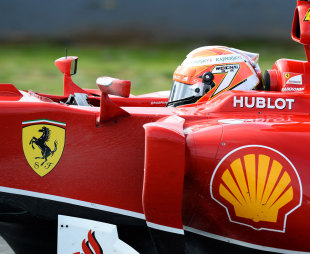
- The Inside Line
When is a sponsor not a sponsor?

In the long dark months (or two short months) between the end of one season and the start of winter testing, there's not much in terms of F1 news doing the rounds. The hunt for stories takes place far from the track, with teams engrossed in finishing up the next year's contender.
In those fallow times, a great source of F1 news to come can be found in the business and financial pages of your newspaper of choice, where blue-chip sponsors get acres of coverage. But it never pays to read too much into the business section when it comes to involvement in sport - some sponsor relationships are more valuable than the figures alone might suggest.
Shell announced a profit warning shortly before the publication of their year-end results, with profits down to an estimated $16.8 billion from $27.2 billion one year ago. In the business section it was all doom and gloom, with Shell criticised for not waking up to the fact that the era of big spending was over.
You could be forgiven for assuming that with such a drop in profits, Shell would be looking at their corporate spending, and possibly reassessing their fifty-year relationship with Ferrari (among other corporate investments).
But to do so would misunderstand the nature of the technical partnership. Ferrari might not be much use to Shell when it comes to industrial drilling and global oil management. But when it comes to developing products for the retail market, Ferrari's value to Shell is practically unquantifiable.
While tyres were the big story last year, and engines will be the headline grabbers this season, oils and lubricants are going to be a vital part of the discussion. Teams have been working with their fuel and lubricant suppliers to develop high density fuels and multi-grade lubricants in order to find the best compromise between fuel efficiency and component longevity.
For companies like Shell (and Mobil, Petronas, Total, etc.), Formula One is the ideal laboratory for consumer products, a testing ground in which peak performance is the most basic requirement, and where conditions are more extreme than those faced by any road car.
Whatever costs are incurred in developing specialist products for the track can be at least partially written off in R&D and marketing budgets, while the exposure that comes of a successful technical partnership provides all manner of benefit when it comes to positive brand association.
Any company that merely stickers a car is unlikely to stay around for the long haul. But technical partnerships - when done well - are a truly symbiotic relationship, one that exists for mutual benefit.
As far as the Ferrari-Shell relationship goes, there is more than just a long and successful partnership to take into account. This year, teams who have been able to develop their oils and lubricants in concert with the development of their engine will have an advantage over customer teams, both when it comes to component longevity and maximising fuel efficiency.
For Ferrari, Shell could help them get that winning advantage (although Mercedes are in a similar position with Petronas and Red Bull with Total), while a winning Ferrari helps Shell's retail sales. For two technical companies with common interests, mutual benefit is more important in the long-term than a year of falling profits.
